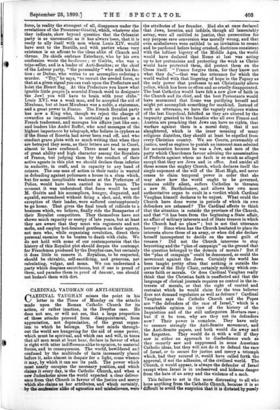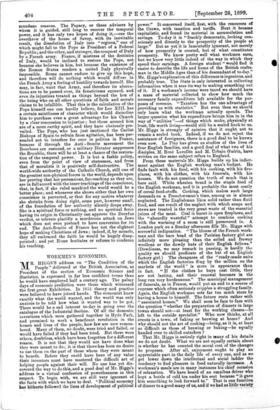CARDINAL VAUGHAN ON ANTI-SEMITISM.
CARDINAL VAUGHAN misses the point in his letter in the Times of Monday on the attacks made upon the Roman Catholic Church for its action, or rather inaction, in the Dreyfus case. He does not see, or will not see, that a large proportion of those attacks proceed from disappointment, from appreciation, not depreciation, of the great organ- ism to which he belongs. The best minds through- out the world are hungering for the aid of some power, which must be spiritual, and which can and will, in tones that all men must at least hear, declare in favour of what is right with utter indifference alike to opinion, to material forces, and to consequences. The world, bewildered an-1. confused by the multitude of facts incessantly placed before it, asks almost in despair for a light, come whence it may, by which it can see its path. The power which most nearly occupies the necessary position, and which claims it every day, is the Catholic Church, and when a new Judenhetze arose the world expected a clear deliver- ance from that Church in favour of the justice and mercy which she claims as her attributes, and which certainly, .by the confession alike of agnostics and. misbelievers, were the attributes of her founder. Had she at once declared that Jews, heretics, and infidels, though all lamentably astray, were all entitled to justice, that persecution for any purpose save conversion was morally wrong, and that even misbelievers were entitled to an invitation to recant and be pardoned before being crushed, doctrines consistent with the loftiest bigotry of the Middle Ages, the world would have declared that Rome at last was acting up to her pretensions and protecting the weak as Christ would have protected them, did protect them on the Cross itself. " France forgive them, for they know not what they do,"—that was the utterance for which the world waited with that lingering of hope in the Papacy as the only power that professes to set Christianity above policy, which has been so often and so cruelly disappointed. The best Catholics would have felt a new glow of faith in the Church and its chief, and the best Protestants would have murmured that Rome was purifying herself and might yet accomplish something for mankind. Instead of such an utterance, we have the vaguely religious wishes of the last Encyclical, falsified as they are uttered by the impunity granted to the fanatics who all over France and Austria are preaching that Jews can have no rights, that warfare against them is a moral duty, that if not slaughtered, which is the inner meaning of many religious diatribes, they should at least be expelled from every Christian country. We see Courts, presumably of justice, used as engines to punish an innocent man selected for accusation because he was a Jew, and men of the party which Churchmen favour advising the assassination of Prefects against whom no fault is so much as alleged except that they are Jews and in office. And amidst all these scenes the mighty Church, which declares itself the single exponent of the will of the Most High, and never ceases to claim temporal power in order that she may show how the world ought to be governed, remains coldly silent, suffers Catholics to threaten a new St. Bartholomew, and allows her own most authoritative organ to exult in a verdict which Cardinal Vaughan himself declares to be unjust. What could the Church have done worse in periods of which its own defenders are ashamed ? The Cardinal affects to think that the situation is outside the province of the Church, and that "it has been from the beginning a State affair, an affair of military interests and of State treason in which the Church had no place" ; but is not that utterance heresy ? Since when has the Church hesitated to place its interests above those of an army, or when did she declare herself incompetent to decide on the moral guilt of treason ? Did not the Church intervene to stop boycotting and the "plan of campaign" on the ground that the question belonged to the domain of morals ? But if the "plan of campaign" could be denounced, so could the movement against the Jews. Certainly the world has been taught pretty often that nothing is outside the purview of the Holy Chair, certainly nothing which con- cerns faith or morals. Or does Cardinal Vaughan really think that the Christian faith is unaffected and that the language of clerical journals requires no control in the in- terests of morals, or that the right of control and restraint which he would claim for the true believer does not demand regulation as well as defence ? Cardinal Vaughan says the Catholic Church and the Popes are "the defenders of the race of Israel," which is a remarkable opinion in view of the history of the Inquisition and of the still unforgotten Mortara case ; but if it be true, why are they not its defenders now ? Their power is complete. They have only to censure strongly the Anti-Semite movement, and the Anti-Semite papers, and both would die away and be forgotten. They would do it with a will if they saw in either an approach to disobedience such as they recently saw and suppressed in some American Catholic ideas, but they will not do it to defend the race of Israel, or to secure for justice and mercy a triumph which, had they secured it, would have called forth the approval, if not the adhesion, of the civilised world. The Church, it would appear, is always the defender of Israel except when Israel is in undeserved and hideous danger from the hate of an army and the violence of a mob.
This failure to act is the more distressing to all who hope anything from the Catholic Church, because it is so difficult to avoid the suspicion that it is dictated by purely mundane reasons. The Papacy, or those advisers by whom it is guided, still long to recover the temporal power, and it has only two hopes of doing it,—one the overthrow of the house of Savoy, with its inevitable result, the dissolution of Italy into " regions," one of which might fall to the Pope as President of a Federal Republic; and the other, and stronger, the conquest of Italy by a French army: France, if mistress of the destinies of Italy, would be inclined to restore the Pope, not because she believes in him, but because the existence of the Roman States renders a united Italy physically impossible. Rome cannot endure to give up this hope, and therefore will do nothing which would diffuse in the French Army a feeling of hostility towards herself. She may, in fact, want that Army, and therefore its aberra- tions are to be passed over, its fanaticisms excused, and even its injustices treated as things beyond the ken of the being who on all other questions of faith and morals claims to be infallible. That this is the calculation of the Pope himself one can hardly believe, for Leo XIII. has a certain saintliness of character which would disincline him to purchase even a great advantage for his Church by a clear concession to injustice ; but those around him are of a more earthy spirit, and they have obviously pre- vailed. The Pope, who has just cautioned the Carlist Bishops of Spain to refrain from agitation, has been per- suaded not to interfere for once in politics in France, because if through the Anti - Semite movement the Bourbons are restored, or a military Dictator suppresses the Republic, there will be at least a chance of the restora- tion of the temporal power. It is but a feeble policy, even from the point of view of statesmen, and from that of moralists it is positively self-destructive. The world-wide authority of the Catholic Church, still one of the greatest non-physical forces in the world, depends upon her proving that her pretensions, far-reaching as they are, are in full accord with the inner teachings of the conscience, that, in fact, if she ruled mankind the world would be a better place ; and whenever she shows either that her own conscience is perverted, or that for any motive whatever she shrinks from doing right, some part, however small, of the foundation of her authority silently drops away. She is a spiritual force or nothing, and no spiritual force having its origin in Christianity can approve the _Dreyfus verdict, or tolerate placidly a murderous attack on Jews which does not even pretend to have conversion for its end. The Anti-Semite of France has not the slightest hope of making Christians of Jews ; indeed, if, by miracle, they all embraced the faith he would be hugely disap- pointed; and yet Rome hesitates or refuses to condemn his teaching.



































 Previous page
Previous page